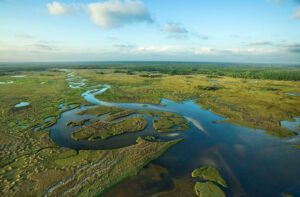The Florida Senate unanimously passed Senate Bill 106, Florida Shared-Use Nonmotorized Trail Network, legislation by Sanford State Senator Jason Brodeur, a Republican, to expand access to Florida’s iconic Wildlife Corridor. The bill would connect the corridor to Florida’s Greenways and Trails System and the SUN Trail Network, as well as recreational pathways to heritage small towns across Florida.
 Florida’s Wildlife Corridor encompasses approximately 17.7 million acres, including almost 10 million acres of conservation lands. The corridor is being created through the state’s purchase of development rights of farmers, ranchers, and other landowners who will be able to continue their operations in perpetuity and the lands will never be developed.
Florida’s Wildlife Corridor encompasses approximately 17.7 million acres, including almost 10 million acres of conservation lands. The corridor is being created through the state’s purchase of development rights of farmers, ranchers, and other landowners who will be able to continue their operations in perpetuity and the lands will never be developed.
Orlando Senator Linda Stewart, a Democrat, joined Sen. Brodeur in sponsoring SB 106. “I’m glad to see leadership in the Florida Senate pass legislation that prioritizes our natural resources in Florida, and I look forward to seeing the good this will do when it goes into effect,” said Senator Stewart.
“Over the last two years, the Legislature has prioritized its investment in the Florida Wildlife Corridor by allocating $600 million for its preservation and expansion. By connecting the corridor to our trail system, Floridians, and people from around the world, can experience our state’s unique natural habitat, as well as connecting athletes and tourists with trail towns across Florida’s heartland,” said Senator Brodeur. “It is legislation like this that leaves a proud legacy for the future generations of Florida.”
From 2020-2022, under the leadership of Florida’s Commissioner of Agriculture, former Senate President Wilton Simpson, the Legislature appropriated $600 million in funding available to expand the Wildlife Corridor.
“The legislation we passed today includes $200 million to connect the corridor to our trail system so more people across our state and around the world can experience Florida’s unique natural habitat,” said Senator Brodeur, who serves as Chair of the Senate Appropriations Committee on Agriculture, Environment, and General Government. “This significant expansion of access to Florida’s iconic Wildlife Corridor will provide even more options for families, athletes, and adventure seekers to experience old Florida at its finest, safeguarding more of our wetlands, farmlands and ranchlands, while improving the visibility of our quaint, legacy trail towns across Florida’s heartland.”
The Florida Shared-Use Nonmotorized (SUN) Trail Program, a priority of former Florida Senate President Andy Gardiner, an Orlando Republican, was created in 2015 to support the establishment of a statewide system of interconnected multi-use trails for bicyclists and pedestrians through coordination between the Florida Department of Environmental Protection (FDEP) and the Florida Department of Transportation (FDOT). The program receives funding from a portion of the existing fees paid when new vehicle registration fees are paid. The FDOT also dedicates other resources, such as federal grant funds, when available, to build bike and pedestrian trails that are part of the SUN Trail Network.
SB 106 formally connects the corridor to the state trail system, extending the SUN Trail Network to lands of the Florida Wildlife Corridor, which will include components that connect to nature trails, loop trails, or other points of public access wholly within a single park or natural area as potential parts of the SUN Trail Network. To fund expansions that connect the SUN Trail to the corridor, as well as the construction of shared-use nonmotorized trails in these areas, the bill increases from $25 million to $50 million the annual amount allocated to the SUN Trail Network from motor vehicle registration fees. The bill also appropriates $200 million from the General Revenue Fund to the FDOT as a nonrecurring major investment to boost the planning, design, and construction of the SUN Trail Network. The legislation also codifies an existing campaign of the FDEP to recognize communities located along or in proximity to long-distance nonmotorized recreational trails as “Trail Towns,” with guidance to Visit Florida for promoting trail-based tourism.
The bill requires that trail projects located within the Wildlife Corridor, to the greatest extent possible, use previously disturbed lands, such as abandoned roads and railroads, utility rights-of-way, canal corridors and drainage berms, and permanent fire lines. Further, FDOT is directed to minimize gaps between trail segments and to ensure, to the greatest extent possible, that local support exists for projects and trail segments, including the potential for dedication of local funding and of contributions by sponsors to support trail maintenance, which may include those private landowners who make their land, or property interests in such land, available for public use as a trail.
This legislation is a top priority of Florida Senate President Kathleen Passidomo, of Naples.
“Our wildlife corridor provides a unique opportunity to experience the wonder and beauty of Florida’s heartland. We have the chance not only to preserve this natural resource for future generations, but to expand access so more Floridians can walk, run, and bike from trail town to trail town, taking in all our great state has to offer,” said Senate President Passidomo. “I envision Florida’s Wildlife Corridor as a top destination for recreational tourists from across the country and around the world. As I have said before, I believe this will be Florida’s Central Park – a legacy we can be proud to leave for future generations of Floridians and visitors to enjoy.”


